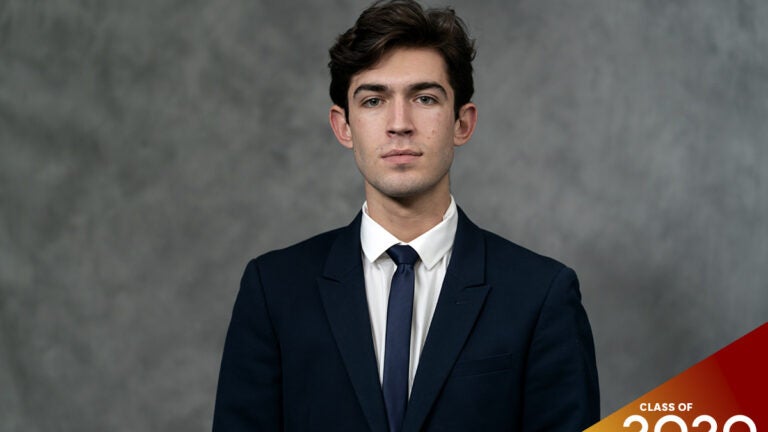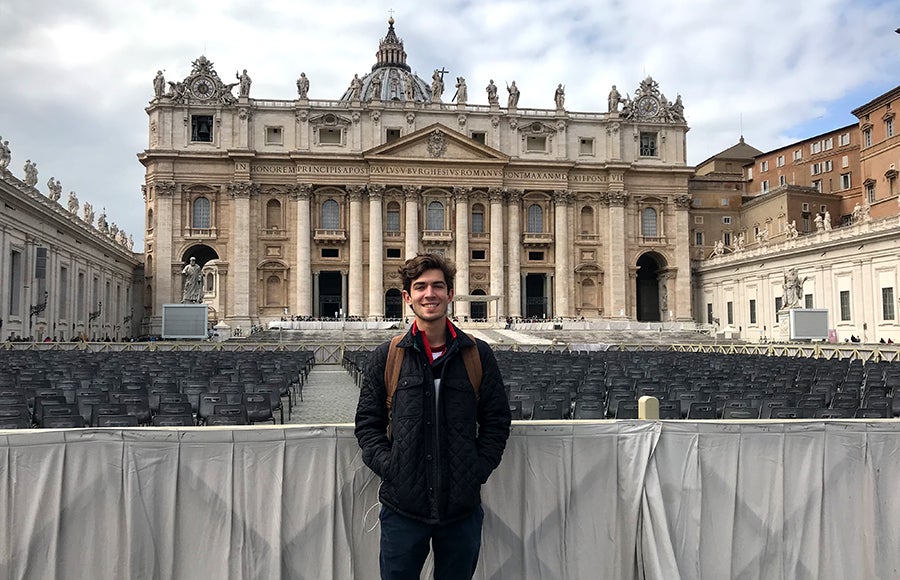
Class of 2020 member is sketching out a future in politics or journalism, and law
Austin Peay is knee-deep in schoolwork, preparing for his finals as a double-major in classics and law, history and culture at USC Dornsife College of Letters, Arts and Sciences.
For his classics final, he’s working on a 15-page thesis on the Temple of Divus Iulius, also known as the Temple of the Deified Julius Caesar — the only temple in the world to be entirely dedicated to the cult of a comet.
Go figure (or, Ire figure, in Latin.)
As a junior at USC Dornsife, Peay spent Spring semester studying in Rome, where he finished his Latin requirement and visited the temple, an ancient structure located in the Roman Forum.
“The temple was just something that really appealed to me,” says Peay. “It was this great confluence of politics and pagan religion and all that stuff.”
Sure, you could say that Peay is a bookish adherent to such intellectual delights as the works of Catullus, a Latin poet of the late Roman Republic, as well as the renowned Roman historian Titus Livius (also know as Livy).

While studying abroad in March 2019, Austin Peay visits the Vatican. (Photo: Courtesy of Austin Peay.)
He’s also known for cruising around town on a 3 ½-foot-long skateboard that resembles a surfboard on wheels and for his love of theater and performing.
Peay, who participated in theater in high school, is a member of The Suspenders, billed as “USC’s oldest sketch comedy troupe.”
“Sketch comedy is a rewarding detox after a stressful week,” says Peay, whose multifaceted skills partly explain why he decided to take on such a demanding double-major.
“I wanted to do as much reading and writing as I possibly could,” he says with a laugh.
Peay, like many of his fellow graduating USC Dornsife seniors, is disappointed about traditional commencement ceremonies being postponed due to the COVID-19 pandemic, but he takes it in stride.
“We can’t complain,” he says. “We’re incredibly more fortunate than I think 99% percent of the rest of the world is right now.”
Trojans in the family
Peay grew up in the Bay Area with his parents and two younger brothers.
Always an avid reader and writer interested in law and history, he settled on USC because of its law, history and culture major. It spoke to his interest in becoming an attorney — ideally, a criminal federal prosecutor — plus all things related to history and politics.
Peay’s mother, Kristen Peay ’89, was a communications major at USC. His grandmother, Barbara Kennett, went to USC Gould School of Law but transferred and graduated elsewhere.
“I’m kind of a third-generation Trojan, but not really,” says Austin.
“The Trojan family has always been a big deal,” he says. “My dad went to UC Santa Barbara, but he fully grafted onto USC after he and my mom met. USC football games were a big thing growing up.”
Soon after he enrolled at USC, Peay’s family relocated to Laguna Niguel. His father, Brian Peay, is CEO of a health care real estate investment trust in Irvine.

Austin Peay on an outing to NBC studios near Burbank, California. (Photo: Christina Bellantoni.)
“They’re bummed about graduation being cancelled,” says Austin. “I’ll drive down to Orange County with my sash for a little pseudo-graduation party.”
Melissa Calderon, Peay’s academic advisor at USC Dornsife, distinctly remembers meeting him and his parents during orientation.
“I remember how nervous and excited they were for him,” Calderon recalls. “I also remember how his mom shared that it ended up being his dad who got more emotional at the goodbye. I remember promising to look out for him.
“Austin was honest, very funny, flexible and determined. He was always a student who came to meetings excited to talk about what was going on in his life and with his plans for classes, even if we met the very first thing in the morning.”
Political junkie
Peay has politics in his blood.
He is a very distant relative of Austin Peay, who served as governor of Tennessee from 1923 to ’27 and who, in 1925, signed the Butler Act, which barred the teaching of evolutionary theory in public schools. That law led to the famous Scopes Trial later that year.
“I mostly have anecdotal evidence from my dad,” Peay says, “but he is something like my great-great-great-great uncle.”
In fall 2018, Peay became the first-ever politics desk editor in the student-led USC Annenberg Media newsroom. He tackled the 2018 midterm elections and the presidential primary. He also was selected for the highly competitive, first-of-its-kind investigative internship known as the Beacon Project.
Peay’s journalism work at USC has spanned the gamut: writing, editing, on-air analysis, radio commentary, and social media coverage that was picked up by national news outlets.
“The second I met Austin, I was impressed by his smarts and his passion for politics,” says Christina Bellantoni, director of the Annenberg Media Center and professor of professional practice at USC Annenberg School for Communication and Journalism.
“As we worked together, I quickly learned his natural writing ability was matched only by his bright personality,” Bellantoni adds. “At any other place, a student without formal training in this kind of work might enter a newsroom and be intimidated by a bunch of journalism majors. Not Austin. He made the Annenberg Media newsroom a second home at USC and has flourished.”
Bellantoni recalls selecting Peay for a reporting project in Iowa to cover the caucuses.
“He soaked in every minute,” she says, “but my favorite moment with him on the trip was driving miles along the winter landscape while we were singing ‘Hamilton’ at the top of our lungs.”
Peay hopes to land a job in journalism or politics after graduating, and take the LSAT (law school aptitude test) next summer.
“Whether Austin decides to stay in the storytelling business or pursue public service,” Bellantoni says, “I’m confident he has a bright future ahead.”